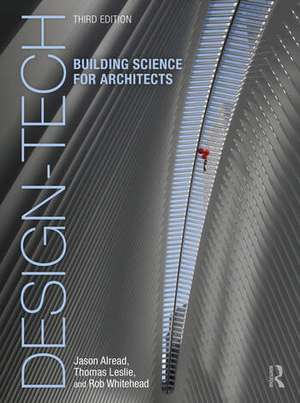Design-Tech: Building Science for Architects
Autor Jason Alread, Thomas Leslie, Rob Whiteheaden Limba Engleză Paperback – 5 mar 2025
The updated format builds a coherent framework for integrated project design studio development, necessary for all contemporary accredited schools of architecture. Chapters build upon critical project information from schematics towards technical integration. New chapters emphasize performance-based design strategies including sustainable design values, critical schematic planning, enhanced building envelope design strategies, and advanced performance systems. Enhanced visualization of schematic design strategies help to explain sustainable design standards, code compliance, and structural schematics, and throughout, the third edition focuses on contemporary issues such as: embodied carbon, heavy timber construction, life cycle costs, and long-term performance.
This will be a must-read for all architecture students looking for an accessible guide to building science.
Preț: 350.68 lei
Preț vechi: 426.41 lei
-18% Nou
Puncte Express: 526
Preț estimativ în valută:
67.10€ • 70.24$ • 55.85£
67.10€ • 70.24$ • 55.85£
Carte nepublicată încă
Doresc să fiu notificat când acest titlu va fi disponibil:
Se trimite...
Preluare comenzi: 021 569.72.76
Specificații
ISBN-13: 9781032442822
ISBN-10: 1032442824
Pagini: 600
Ilustrații: 950
Dimensiuni: 210 x 280 mm
Ediția:3
Editura: Taylor & Francis
Colecția Routledge
Locul publicării:Oxford, United Kingdom
ISBN-10: 1032442824
Pagini: 600
Ilustrații: 950
Dimensiuni: 210 x 280 mm
Ediția:3
Editura: Taylor & Francis
Colecția Routledge
Locul publicării:Oxford, United Kingdom
Public țintă
UndergraduateCuprins
Section 1: Pre-Design: First Principles of Integrating Design Technology 1.0. Introduction: Design Values and Purposeful Integration of Building Technology 1.1. Design for People: Anthropomorphics and Comfort 1.2. Design for Place: Climatology, Solar Geometry, Site Ecology, and Site Analysis 1.3. Design with Materials: Properties, Assessment, Selection, Planning, and Sustainability Section 2: Schematic Design: Planning & Priorities 2.0. Introduction: Planning and Priorities for Integrating Technology 2.1. Programming, Zoning, and Parti 2.2. Building Relationship to Environment: Passive Ventilation and Daylighting 2.3. Material Properties: Timber, Masonry, Metal, Glass, Concrete, and Composites 2.4. Structural Schematics: Shaping Form, Space, & Order 2.5. Structural Systems: Principles of Support, Framing, & Force Flow 2.6. Circulation: Life Safety, Accessibility, and Vertical Transport Section 3: Design Development: Putting it Together 3.0. Introduction: Strategies for Integrated Development 3.1. Evaluating Structures: Understanding Strength, Stiffness, Suitability, and Stability 3.2. Structural Materials & Assemblies: Load Grounders, Collectors, and Stabilizers 3.3. Building Enclosure: Envelope and Curtain Walls 3.4. Interior Finish Materials: Walls, Ceilings, and Floors 3.5. Mechanical, Electrical, and Plumbing Systems 3.6. Sensory Environments: Acoustics and Lighting Section 4: Advanced Integration: Designing for Performance 4.0. Introduction: Performance and Integration 4.1. Detailing: Fit, Organization, Consistency, Robustness, Durability, and Finish 4.2. Long Span Structures: Trusses, Shells, & Lightweight Structural Systems 4.3. High Rise Structures 4.4. High-Performance Buildings: Principles of Passive House and Net Zero Design
Notă biografică
Jason Alread, AIA, LEED AP is a Professor and the former Director of the School of Architecture at the University of Florida. He was educated at UF and Yale University, and has been a registered architect in professional practice for over 30 years. His teaching and research focus on the integration of craft and technology, building performance, design methodologies, and professional practice.
Thomas Leslie, FAIA, teaches building design, history, and technology at the University of Illinois, Urbana-Champaign. Leslie received degrees in architecture from Illinois and Columbia and spent seven years with Norman Foster + Partners, London and San Francisco. He has written extensively on the history of building arts and sciences.
Rob Whitehead, FAIA, LEED AP is a licensed architect, Associate Professor of Architecture, and an Associate Dean at Iowa State University’s College of Design. His teaching experience includes integrated design studios, design-build courses, and an award-winning structural design course sequence at Iowa State University. His book, Structures by Design: Thinking, Making, Breaking has been adopted worldwide.
Thomas Leslie, FAIA, teaches building design, history, and technology at the University of Illinois, Urbana-Champaign. Leslie received degrees in architecture from Illinois and Columbia and spent seven years with Norman Foster + Partners, London and San Francisco. He has written extensively on the history of building arts and sciences.
Rob Whitehead, FAIA, LEED AP is a licensed architect, Associate Professor of Architecture, and an Associate Dean at Iowa State University’s College of Design. His teaching experience includes integrated design studios, design-build courses, and an award-winning structural design course sequence at Iowa State University. His book, Structures by Design: Thinking, Making, Breaking has been adopted worldwide.
Descriere
The third edition of Design-Tech provides an indispensable, holistic resource for integrating building technologies into critically designed, performance-based architectural projects.
